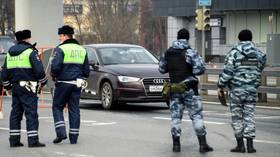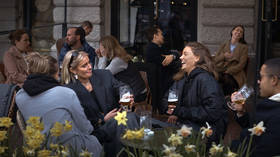As restrictions spread across Europe, 69% of Muscovites willing to sacrifice rights to defeat coronavirus – poll

One of the ironies of the Covid-19 crisis in Russia has been the sight of liberal opposition groups urging the Kremlin to do more to restrict people’s movement at the expense of civil liberties. In Moscow, people seem to agree.
Already, people’s movement has been drastically restricted in the capital. All non-essential business and activity has been suspended, and hefty fines can be issued for breaking self-quarantine rules.
A survey suggests that most people in the capital are entirely on board with the new restrictions. According to research group Romir, more than two-thirds of Moscow residents (69 percent) are supportive of temporary rights restrictions to combat coronavirus, with just 28 percent disagreeing. In March, a similar poll showed only 60 percent in favor of such measures.
“Don’t forget that the city’s inhabitants have not yet faced really restrictive measures,” said Romir President Andrey Milekhin. “Perhaps the answers show a growing fatigue with the current situation and the desire to seize on any opportunity leading to the return of normal life.”
The survey’s results show some interesting dichotomies within Russian society, with older and less-educated people seemingly more willing to give up their rights. The most-accepting Muscovites were those aged 39-45 (73 percent) and residents with only secondary education (77 percent).
Dissent mainly stemmed from the youngest demographic, with less than half (42 percent) of 18-24 year olds being supportive. Those with higher education or a degree were even less enthusiastic – with only 31 percent expressing approval.
In March, an international survey by Romir discovered that Russians were way behind some of their European counterparts in supporting rights restrictions. In that survey, Austrians were the most supportive with 95 percent of respondents approving of curtailment.
Also on rt.com Battling Covid-19: Moscow to ‘gradually’ introduce pass system for movements around city amid partial lockdownAs of April 13, Russia has recorded 18,328 cases of Covid-19, with the majority (11,513) located in Moscow. The prevalence of coronavirus in the capital has led to a strict self-isolation regime and heavy restrictions on reasons for leaving home. From April 15, Muscovites will need a digital pass to travel around the city by private car, taxi or public transport.
Think your friends would be interested? Share this story!














